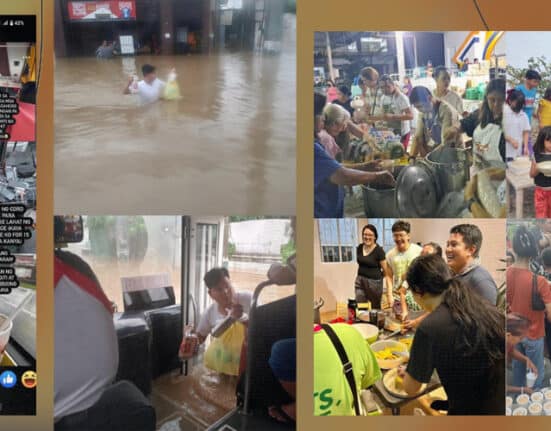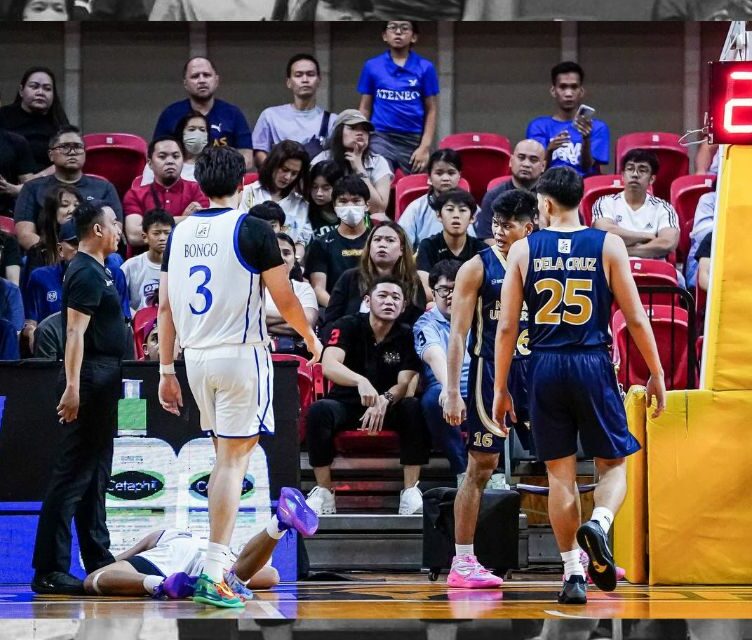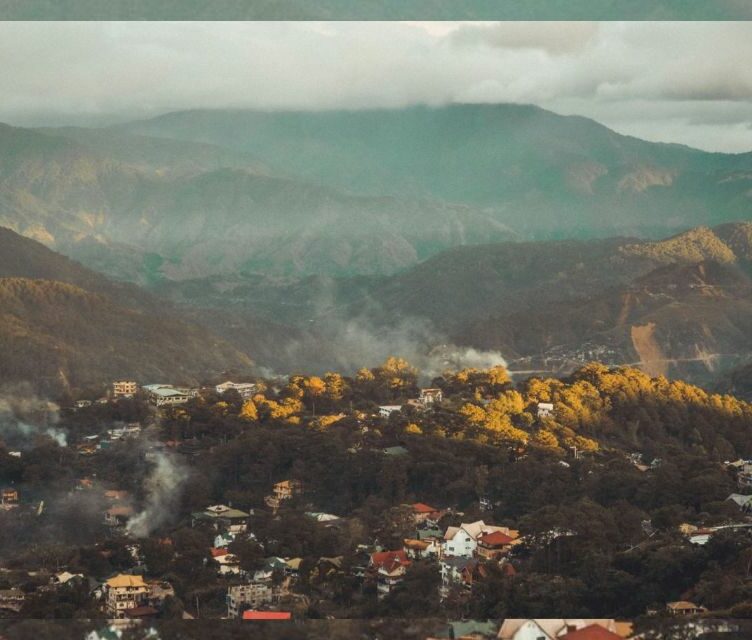Typhoon Carina battered the country last week, bringing heavy rains and massive floods in several parts of Luzon.
The typhoon did not even make landfall in the Philippines but its effects, combined with the Southwest Monsoon or Habagat, impacted the lives of millions of Filipinos.
In its latest data, the National Disaster Risk Reduction and Management Council (NDRRMC) reported that the number of typhoon victims climbed to 4.8 million, leaving 39 individuals reportedly dead.
The typhoon also placed several areas in the country, including the National Capital Region (NCR), under a state of calamity, which allowed local government units to utilize their calamity funds to rescue and provide aid to the affected individuals in their jurisdiction.
Several Filipinos lost their houses due to the massive floodings, lost access to food and other necessities, and got stranded for hours in vehicles as floodwaters continued to rise and made roads impassable.
While waiting for rescue, some relived the Filipinos’ “bayanihan” spirit by taking the initiative to extend a helping hand to their affected kababayans (countrymen).
Bus drivers, conductors heroic services
Come rain or shine, bus drivers embark on a daily mission of transporting approximately 60 passengers per trip to their destinations. They navigate busy city streets, peaceful country roads, and even the narrowest and steepest paths, ensuring the safety of each passenger as they return home to their families.
Meanwhile, bus conductors help with luggage, collect fares, give tickets, and remind passengers when they arrive at their destinations.
But these bus drivers and conductors go beyond their responsibilities when everybody goes through challenging times—like how viral bus driver Danilo Magtalas and bus conductor Alfie Sta. Ana touched humanity with their heroism when they helped stranded passengers at the height of Typhoon Carina and the enhanced Habagat.
On July 26, social media user Cher Bheng Magtalas, sister of the bus driver, posted a screenshot of a Facebook story, narrating how her brother helped his passengers when they were stranded along the North Luzon Expressway (NLEX) for hours.
The Facebook story was originally posted by netizen Mitch Bautista, one of the stranded passengers.
Bautista shared how Magtalas made their dreadful experience “bearable” by ensuring his passengers’ safety and providing easy access to their needs.
“Ginawan niya ng CR (comfort room) sa likod ng bus para sa mga babae. Yung mga pasahero ng ibang bus kailangan pa lumabas at pumunta sa gas station na malayo sa lugar naming Kahit umuulan para umihi,” wrote Bautista.
“Inilapit niya kami sa mga nagtitinda para makabili ng makakain at maiinom (cup noodles FTW),” she added.
He also made sure that the passengers would not lose communication by allowing them to charge their phones on the bus.
“Kumpleto siya ng cord for every type para makapag-charge lahat ng need mag-charge (kaya tumagal phone ko for 15 hours dahil sa kanya),” Bautista said.
“Hindi pinatay ang makina buong araw,” she continued. “Hindi naubusan ng energy. Nakangiti at nagjo-joke siya buong araw para masaya kaming lahat.”
Above all, Bautista said Magtalas managed to safely bring all his stranded passengers back home.
Meanwhile, another Facebook user with the handle Chloe Dela Cruz shared how Sta. Ana braved the chest-deep flood in Marilao, Bulacan to get stranded and hungry passengers food, despite health risks.
“Na-stranded ang bus na sinasakyan ko sa Marilao sa gitna ng baha mga 8 a.m. kahapon. Ilang oras kaming naghintay ng rescue pero walang dumating,” narrated Dela Cruz in her Facebook post which had over 1,800 shares.
She went on, “Bandang 4 p.m., lahat kaming sakay ay halos gutom na. More than [seven] hours na kaming stranded. Lumusong yung kundoktor namin sa hanggang dibdib na baha para bumili ng tinapay at tubig para sa lahat.”
The bus conductor waded through the flood again to seek rescue but to no avail. Some passengers decided to submerge themselves in floodwaters to get home.
“Imagine yung hanggang dibdib na baha, malakas na current, madumi at mabahong tubig, sinamahan ulit kami ng kundoktor, dinala pa yung mga bags namin sa balikat niya para makapagkapit-kapit kami at walang matangay ng agos,” recalled Dela Cruz.
“Akala ko pagdating sa may mababaw, iiwan niya na kami at hahayaan na umuwi. Nope, sinamahan niya rin kami sumakay sa truck, lumusong ulit, umangkas ulit, lumusong ulit,” she added.
Sta. Ana continued to assist the commuters until they arrived in Bocaue where he bought dinner and escorted the passengers to the next bus that brought them to Bulakan.
In her post, Dela Cruz expressed her sincere appreciation for the bus conductor, whom she described as a reliable employee.
Addressing the company Sta. Ana is working for, the passenger said, “Hindi po namin alam kung safe kaming makakauwi if not for him. Kung anuman po ang lagay ng bus na naiwan sa baha kahapon, we’re not sure. Pero yung magkaroon kayo ng employee na maaasahan sa kahit anong sitwasyon ay sobrang laking asset na para sa inyong kumpanya.”
In an interview with ABS-CBN News, Sta. Ana said he only did his job to ensure the safety of the passengers.
“Kasi ang iisipin mo talaga ‘yong kapakanan ng mga sakay mo, ng mga pasahero. Kasi public servant kami sa transportation. Talagang kapakanan ng pasahero ang kailangan mong unahin bago ang sarili mo,” he explained.
356+ Community kitchens opened for typhoon Carina victims
The Filipino culture of bayanihan also extends to the simple gestures of citizen-led services.
Ana Patricia “Patreng” Non, who started the initiative of the community pantry at the height of the COVID-19 Pandemic, reactivated the cause to deliver aid to typhoon victims.
She opened community kitchens to provide hot meals to evacuation centers and handed affected individuals necessities like dry clothes, blankets, and sanitary products.
From July 23 to 29, the community-led initiative was able to help 19 cities and provinces, reaching an estimated 20,004 families, thanks to volunteers’ efforts and donations from private citizens.
Non shared that even victims of the calamity showed up to help during the trying times.
Daily updates and transparency reports can be seen on Non’s Facebook page to locate their community kitchens and the areas they have sent help.
No family left behind
With four legs and a heart twice their size, furry companions are always there not only to guard homes but also to brighten up their hoomans with their adorable activities, affectionate behaviors, and dumb faces.
But pets are no longer just companions, they are part of their owner’s family. When a calamity hits the country, their hoomans make sure they are not left behind—like how these two men were seen carrying their dog in a styrofoam box.
Another TikTok video showed a group of men moving a boat that carried two large dogs in a village submerged in knee-deep floods.
@jpocariz ang cuuuuuute ng doggies. hahahahaha. #nopetsleftbehind #carina #habagat
♬ Cute – Aurel Surya Lie
But there were still individuals who forgot to unchain and uncaged their pets, perhaps in their panic, to flee.
This prompted the Philippine Animal Welfare Society (PAWS), a non-government organization, to spread the importance of including furry family members in one’s evacuation plan.
The organization called on the pet owners to uncage or unchain their furry companions to give them a fighting chance and allow rescuers to find them if the owners could not save them.
Fandom-led charitable deeds
Filipino fans of K-pop and P-pop groups also joined forces together to initiate donation drives for the typhoon victims, one of them was Hand In Hand PH—a union of Philippine K-pop fan clubs and organizations.
The community was able to raise P17,098.60 through its donation drive, according to its July 29 post on X (formerly Twitter).
[2024 DONATION DRIVE STATUS]
— Hand In Hand 손에 손 PH // #HandInHandPH (@HandInHandPH) July 29, 2024
As of July 29, 2024, 7PM, we have collected a total of Php 17,098.60 from 10 donors.
We sincerely thank you from the bottom of our hearts!❤️ Together, let us help HAND IN HAND for the victims of ST Carina! #HandInHandPH pic.twitter.com/dHBUD7yEFW
Fans of K-pop boy group SEVENTEEN, collectively known as CARATs, also raised P26,949 through a donation drive by Boosadan PH on X.
Boo Seungkwan Ph along with other the fanbases for SVT members have come together to raise a donation drive for those who have been severely affected by the Super Typhoon Carina.
— Boosadan PH 🍊 (@BooSeungkwanPH) July 24, 2024
Contributions will be donated to Angat Buhay and various pet shelters in need.#CarinaPH pic.twitter.com/rMERvfJtlw
A’TIN, fans of P-pop powerhouse SB19, launched the 18 Donation Drive, an emergency project that provided financial and in-kind donations to the typhoon victims.
🚨📢Calls for Donations!
— 18 Donation Drive (@18donationdrive) July 24, 2024
18 Donation Drive is now accepting cash donations to help communities affected by #CarinaPH.@SB19Official #SB19 pic.twitter.com/6s61zpjqmV
As of July 28, A’TIN accumulated a total of P249,678.78 monetary donations.
BLOOM Philippines, the fanbase of P-pop girl group BINI, also opened its own donation drive that accepts monetary and in-kind donations like ready-to-eat food, bottled water, toiletries, blankets, vitamins, and pet food.
#ProjectBINIyanihan Activated
— BLOOM PHILIPPINES (@TEAMBLOOMPH) July 24, 2024
𝗖𝗔𝗟𝗟 𝗙𝗢𝗥 𝗗𝗢𝗡𝗔𝗧𝗜𝗢𝗡𝗦 📢
Bloom Philippines Fanbases are now accepting donations for our brothers and sisters affected by Typhoon #CarinaPH and Southwest Monsoon
For monetary donations, kindly check the pubmat below for the details.… pic.twitter.com/9xsSb578KG
Relying on resiliency
The indomitable human spirit lives on through modern heroes from all walks of life: a bus driver, a volunteer, a neighbor, or someone who helps those in need and inspires others to do the same.
However, there is a limit to how much a single person can do. This is where organized government actions and plans come into play to ensure that affected Filipinos get the assistance they need.
In a GMA News report, the Department of Public Works and Highways (DPWH) said that the master plan for flood management in Metro Manila has yet to be completed.
DPWH Secretary Manuel Bonoan shared that the flood control plan for the capital region is below 30 percent complete due to its “several components.”
“Sa amin sa DPWH, is actually ‘yung sa pagdaloy ng floodwater along Pasig River. There are other components like environmental, social, and other issues,” he was quoted as saying in the article.
He added, “Unfortunately when we came in, hindi pa nasisimulan ‘yung ibang mga components.”
The 351-billion long-term flood management master plan for Metro Manila was approved in 2012, under the administration of the late President Benigno Aquino III.
The flood control plan is expected to be completed by 2035.
On the other hand, the Department of Social Welfare and Development (DSWD) provided 70 million worth of relief and aid such as food packs, family kits, hygiene kits, laminated sacks, and kitchen kits.
With millions of Filipinos left distraught by the combined effects of Typhoon Carina and the enhanced Habagat, the Philippine government should step up its actions to ensure the safety of and the swift delivery of aid to affected communities.
Each disaster becomes worse and worse as generations pass, and there may come a time when resilience may no longer be enough to overcome challenges that can be avoided through effective disaster risk reduction and management.
With reports from Gella J. Aboratigue, Catherine Jules C. Juvida, & Prince Bryan J. M. Marquez
How useful was this post?
Click on a star to rate it!
Average rating 0 / 5. Vote count: 0
No votes so far! Be the first to rate this post.
We are sorry that this post was not useful for you!
Let us improve this post!
Tell us how we can improve this post?







